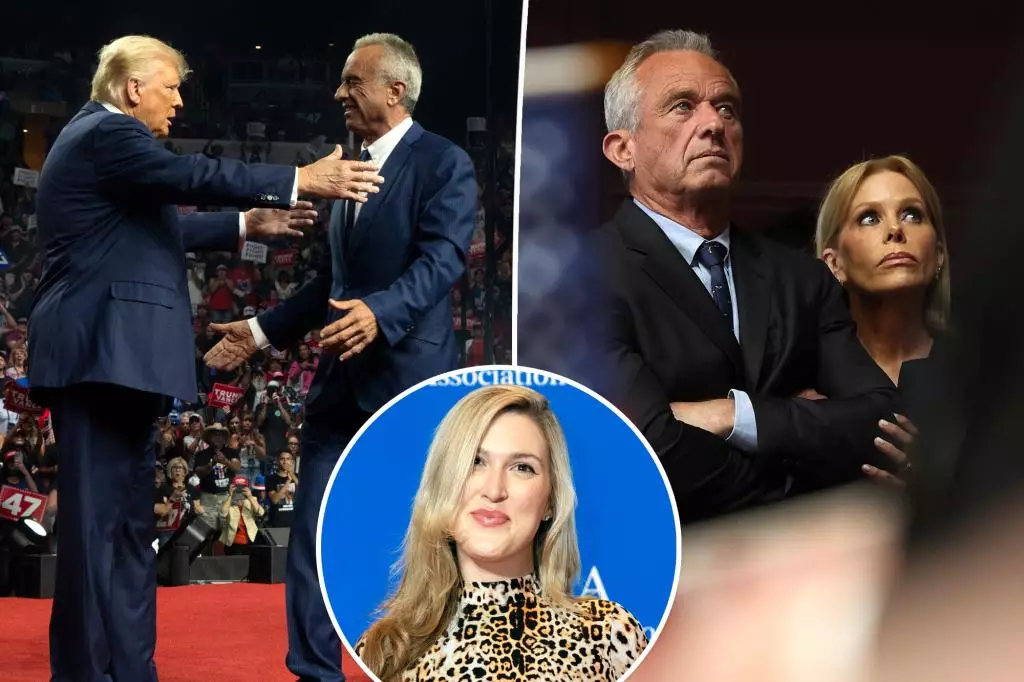The recent revelations surrounding Robert F. Kennedy Jr. (RFK Jr.) have stirred the political pot, intertwining personal relationships with the broader implications for his potential role within a future Trump administration. As details emerge from his controversial interactions, including an alleged affair with New York Magazine’s Olivia Nuzzi, three other women have also accused him of engaging in romantic connections. This presents a fascinating study not only of personal accountability but also of the evolving political dynamics within the Republican Party.
In political spheres, scandals often seem to surface with an ironic timing that amplifies their impact. RFK Jr., a figure with a complicated legacy due to his family’s historical prominence, finds himself at the intersection of scandal and political opportunity. While traditional viewpoints might wager that such allegations would derail a political career, insiders suggest otherwise. As the narrative unfolds, it’s reported that Trump’s circle is neither surprised nor deterred by Kennedy’s alleged indiscretions. In fact, the modern GOP appears to have moved past the moral scrutiny that once plagued its ranks.
Central to this audacity is the realization that the political echelons are increasingly less concerned with personal failings in private life. The comments of various political insiders indicate a shift toward acceptance, reflecting a broader cultural change that prioritizes electoral success over moral judgments. This nonchalance has significant implications: it allows candidates to retain influence and pursue powerful positions despite personal controversies. The growing sentiment is that personal affairs, such as infidelities, are inconsequential as long as political ambitions remain aligned with party objectives, a sentiment echoed by several party insiders.
Despite the apparent indifference of GOP insiders, concerns still simmer regarding the repercussions of Kennedy’s alleged affairs. As Kennedy himself dropped his presidential aspirations to endorse Trump, speculation has arisen that these allegations might affect his potential appointment to a significant admin role if Trump returns to the presidency. Some in the political community have noted that while these relationships may raise potential red flags about security clearances due to risks of blackmail, plenty of opportunities exist within the administration that wouldn’t require such vetting. This opens a pathway for Kennedy to possibly integrate into health-related departments without succumbing to the scrutiny tied to his personal life.
However, it is essential to acknowledge the darker undertones of these situations — the implications of reputational damage, family turmoil, and the conservative values that existed in earlier political landscapes. Reports of RFK’s relationship with Nuzzi—a 31-year-old reporter—have sparked discussions about his marriage to actress Cheryl Hines, leading to speculation that she may consider ending their union. Such personal ramifications resonate beyond just the public personas; they delve into the complexities of loyalty and trust within the private lives of political figures.
Kennedy’s saga is by no means an isolated phenomenon. The modern political trail is peppered with figures like Donald Trump, who have navigated similar waters yet have found ways to sustain their political capital. Both men have faced accusations and controversies regarding their personal lives. Trump, notably, has faced numerous allegations of sexual misconduct and infidelity throughout his career, yet these accusations have seldom seemed to dampen his political appeal among his base.
This cultural shift invites a compelling inquiry: are voters desensitized to scandal, focusing instead on the efficacy and alignment with party ideologies rather than the moral fiber of candidates? A generation that has witnessed political figures contend with public scrutiny surrounding their infidelities may now prioritize policy positions over personal failings. Therefore, it is essential to consider how this dynamic reshapes public trust in political leaders, with voters potentially viewing scandals as merely part of the political game.
As Robert F. Kennedy Jr. navigates these turbulent waters of personal and political upheaval, the lessons drawn from these events are multilayered. The intersection of personal scandal and political ambition in contemporary America raises critical questions about our priorities as a society. As RFK Jr. prepares for what may lie ahead, both within his personal life and the political realm, the landscape may soon redefine what we consider acceptable in our leaders. The ongoing evolution of the GOP, its less inhibited stance regarding personal scandals, and the implications for future governance will continue to shape American politics in ways that may surprise, challenge, and even inspire.

Leave a Reply